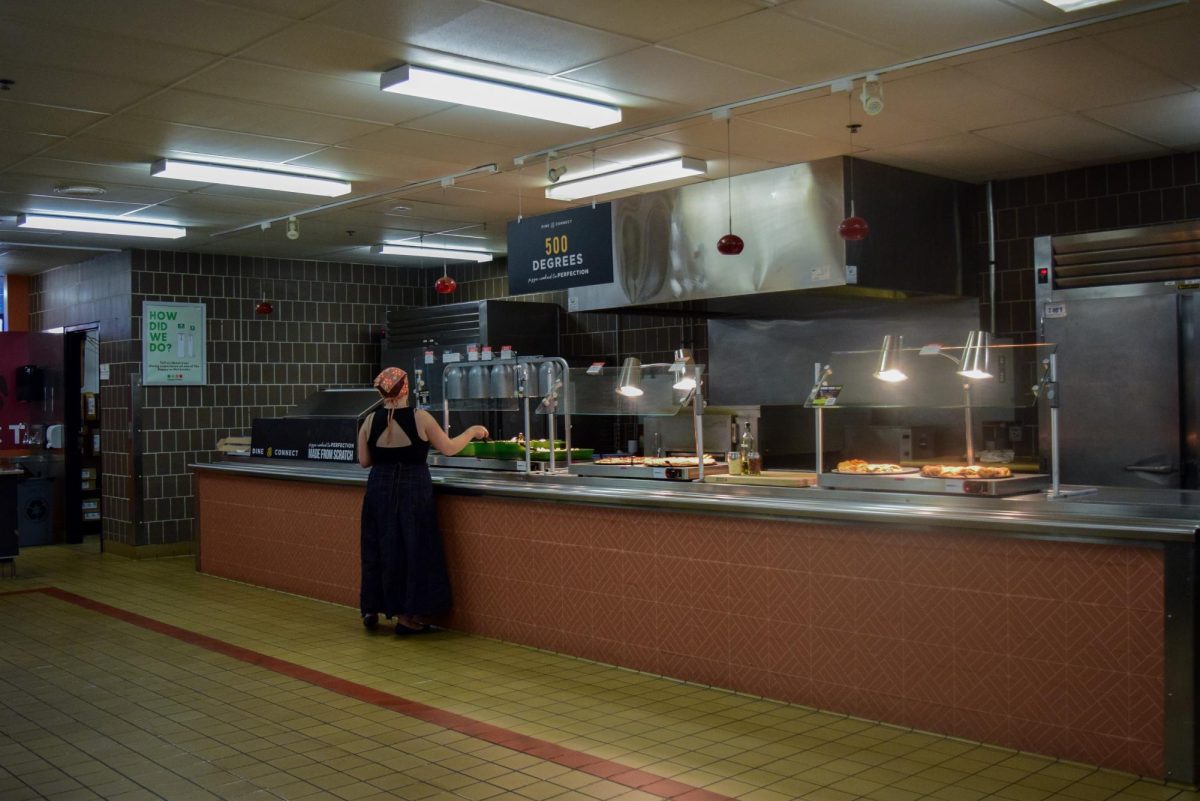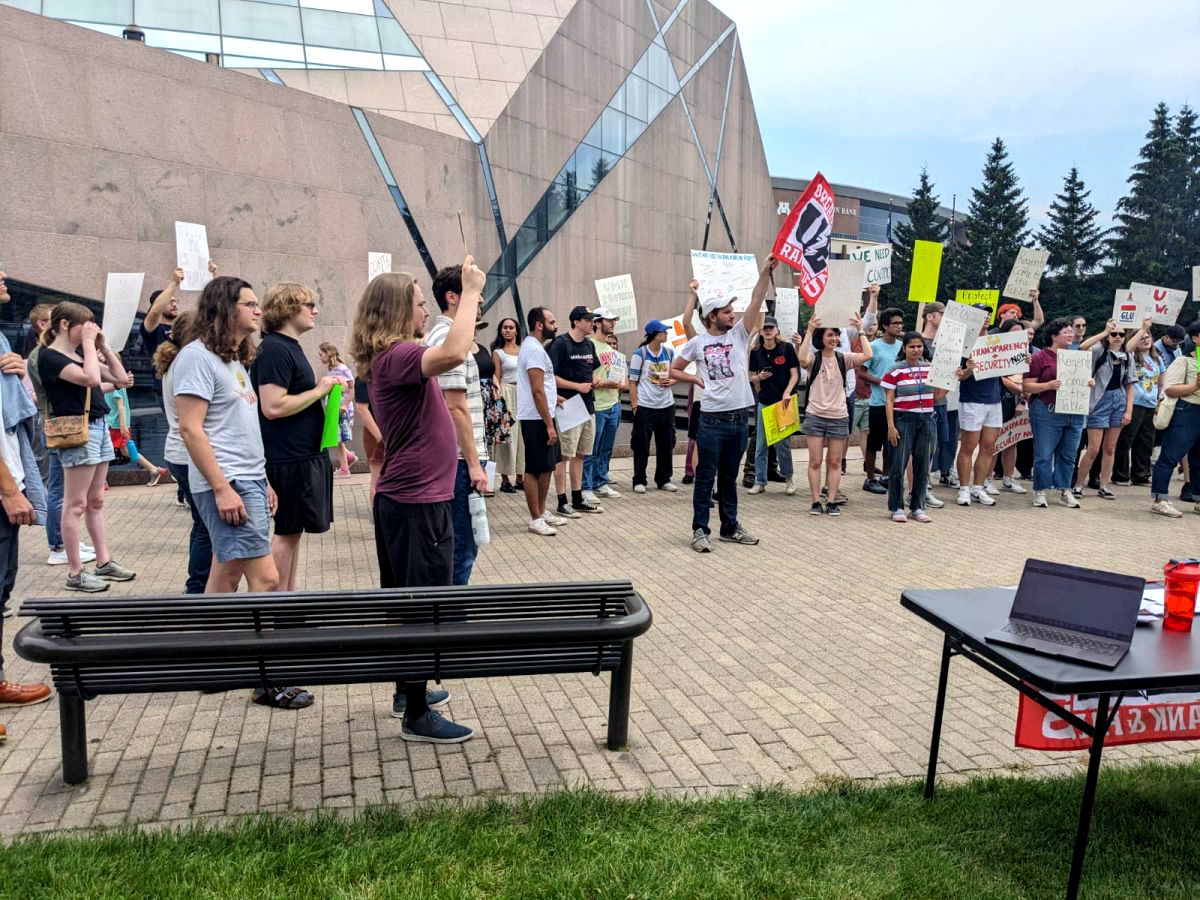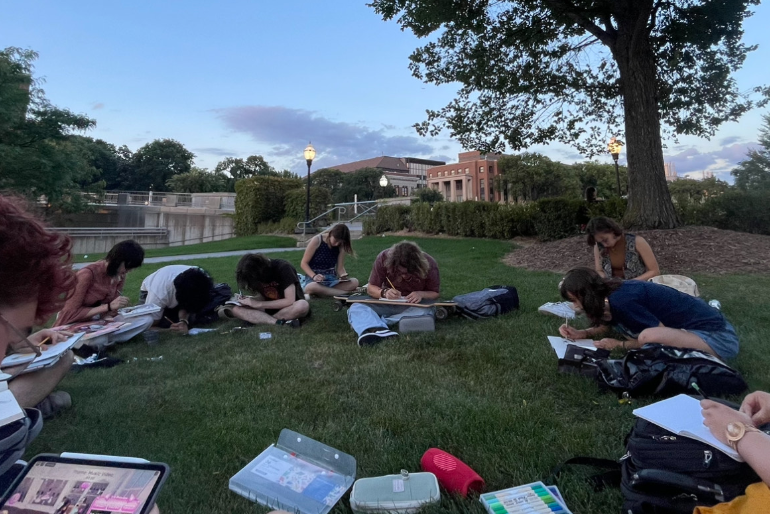Teamsters Local 320 filed an unfair labor practice charge against the University of Minnesota Tuesday on the issue of dining hall employees and summer work.
Teamsters alleged the University committed two violations of the Minnesota Public Employment Labor Relations Act, according to the charge. The first allegation is the University has not negotiated in good faith on the topic of summer work and the second is the University not allowing Teamsters union to file union grievances.
The Teamsters negotiated and agreed to a new labor agreement in October 2022 with the University that contained a Memorandum of Understanding concerning summer work for University dining employees on the Twin Cities campus, according to the charge.
The memorandum was meant to create work opportunities for dining employees during the summer break and provide a guarantee of 30 hours of work per week for 12-month dining employees who participated in a bidding process for summer work.
Jackson Kerr, a Teamsters business agent, said most of the summer positions offered this year do not start until June or July. He added this is a violation of the agreement, which says the University should provide all positions a minimum of 30 hours of work for each week over the summer.
For the over 150 12-month dining services employees, there are about 85 summer jobs offered with 10 more positions available in departments not in dining, Kerr said.
“That is one thing that we believe we were misled on during negotiations,” Kerr said. “We believe that the University negotiated in bad faith.”
Kerr is the one who filed the charge and he said he sent it to the Public Employment Relations Board (PERB), which will have a hearing on the matter and may assign an investigator to look into the alleged charges.
If found guilty, Kerr said PERB can direct the University to follow the law and make changes in regard to the union and summer work.
Kerr added the University has an opportunity to meet with the union to settle any disputes brought up in the unfair labor practice before PERB does anything.
“We have a serious problem right now with how the University is implementing the summer work program that we negotiated and it’s our belief as a union that the University is purposefully undermining the contract language that they negotiated a couple of years ago,” Kerr said.
In an interview several hours before the unfair labor practice charge was filed on Tuesday, University Services Vice President Alice Roberts-Davis said she had not heard of any issues in regard to the contract or summer work. Through a University spokesperson, Roberts-Davis declined to comment after the charge was filed, saying it is not University practice to comment about active litigation.
“People are always excited for summer for a variety of different reasons,” Roberts-Davis said. “Some of them want to continue to work during the summer and that’s what’s best for them and their family situation. Other people are really excited about taking the summer off and they’ve got kids that they want to spend time with or travel or do whatever they enjoy doing in the summer.”
According to Roberts-Davis, the number of positions available tends to work out with the number of people interested in summer work, and if not, an on-call list is another option.
Sam Thibert is currently a cook at Pioneer Hall but with the way the bidding process for this summer’s jobs went, he will be on-call for the summer.
Thibert said round one of the bidding process is to bid on jobs within the same current classification. He added every position he was offered in round one consisted of extremely inconsistent hours.
“For the last two years, I’ve structured my life around working 12 to 8 [p.m.], or being a p.m. cook,” Thibert said. “With the schedules that are offered, they’re forcing me to commit to work 6[a.m.] to 2[p.m.] one day, the next day come in 12 to 8[p.m]. I just can’t, that’s just not something that works for me, I can’t commit to that.”
Thibert said by round two of the bidding process, the only position available to him was in facilities management, working from 7 a.m. to 2 p.m., after he clarified he could not work mornings.
“In my case as a cook, the amount of jobs compared to last summer for cooks were extremely limited,” Thibert said. “A lot of the cook jobs were converted into food service worker jobs.”
According to Thibert, few employees got what they wanted unless they were high on the seniority list. He added this left people the choice to either be flexible in taking the job or be unemployed.
“For nine months out of the year, we’re essential to their operation while they’re making money hand over fist,” Thibert said. “As soon as the little short few months where they’re not raking it in as much, they’re just showing that it’s not their priority to take care of us and the amount that they are is the bare minimum right now.”
Roberts-Davis said the University puts a lot of effort into ensuring contracts are clear so people understand what they are expected to do and what the University expects in return.
“We want to ensure that workers’ rights are very important to us and that we are monitoring the activities within all of the dining halls so that people are being treated fairly and that the contracts are being administered properly,” Roberts-Davis said.
Kerr said this situation creates problems for people who do not know what to expect when it comes to summer work because of things like rent, groceries or taking care of family.
“If the University simply did what they told us they were going to do at the negotiations table, it would have a real positive impact on the lives of the people who feed all the students and keep this University running,” Kerr said.
Thibert said the University told him the issue of fewer available positions is due to a lack of business. He added he believes the University should find a way to generate more business.
“From a worker’s perspective, it feels like it’s the University’s responsibility to generate that business during the summer and make sure that this business is there for us when they’ve made this commitment to us,” Thibert said. “Now it feels like we’re in a situation where they’re tiptoeing around language and not acting in good faith and kind of hanging a lot of people out to dry.”
If the University does not want to meet the employees halfway, Thibert said the middle ground would be to have “some human consideration” when making schedules.
Kerr said he hopes the University will meet with Teamsters and the employees to settle any issues and that changes can be made soon.
“We hope that the University will recognize the impact that this is going to have on its employees’ well-being and that they can make these changes before the end of the spring semester, the school year,” Kerr said.















Aundre C
May 3, 2024 at 5:13 pm
Not really sure if we can call this journalism because clearly the writer didn’t substantiate any claims. Took me a few minutes to find the contract and MOU online to read that it basically spells out the summer work process. They will have a hard time winning this one. The better option is this Sam guy needs better representation by a union business agent that reads and understands words in how own contract